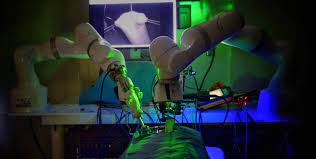
Breaking News
 70% of the food that we eat is ultra-processed. It's not really food - it's poison.
70% of the food that we eat is ultra-processed. It's not really food - it's poison.
 No one had more insider information than Jeffrey Epstein,...
No one had more insider information than Jeffrey Epstein,...
 What's REALLY Behind Mexico's Cartel Wars?
What's REALLY Behind Mexico's Cartel Wars?
 Under Siege, Silver Dave: Locked in Puerto Vallarta
Under Siege, Silver Dave: Locked in Puerto Vallarta
Top Tech News
 New Spray-on Powder Instantly Seals Life-Threatening Wounds in Battle or During Disasters
New Spray-on Powder Instantly Seals Life-Threatening Wounds in Battle or During Disasters
 AI-enhanced stethoscope excels at listening to our hearts
AI-enhanced stethoscope excels at listening to our hearts
 Flame-treated sunscreen keeps the zinc but cuts the smeary white look
Flame-treated sunscreen keeps the zinc but cuts the smeary white look
 Display hub adds three more screens powered through single USB port
Display hub adds three more screens powered through single USB port
 We Finally Know How Fast The Tesla Semi Will Charge: Very, Very Fast
We Finally Know How Fast The Tesla Semi Will Charge: Very, Very Fast
 Drone-launching underwater drone hitches a ride on ship and sub hulls
Drone-launching underwater drone hitches a ride on ship and sub hulls
 Humanoid Robots Get "Brains" As Dual-Use Fears Mount
Humanoid Robots Get "Brains" As Dual-Use Fears Mount
 SpaceX Authorized to Increase High Speed Internet Download Speeds 5X Through 2026
SpaceX Authorized to Increase High Speed Internet Download Speeds 5X Through 2026
 Space AI is the Key to the Technological Singularity
Space AI is the Key to the Technological Singularity
 Velocitor X-1 eVTOL could be beating the traffic in just a year
Velocitor X-1 eVTOL could be beating the traffic in just a year
Robot performs 1st abdominal surgery without human help

The STAR, short for Smart Tissue Autonomous Robot, operated on the soft tissue of pigs to reconnect two ends of an intestine, which is said to be one of the most intricate and delicate tasks in abdominal surgery.
"The STAR performed the procedure in four animals and it produced significantly better results than humans performing the same procedure," said senior author Axel Krieger, an assistant professor of mechanical engineering at Johns Hopkins' Whiting School of Engineering.
The STAR has high repetitive motion and precision capability. Along with high precision imaging for accuracy, researchers say it can adjust to soft-tissue changes in real-time. Soft-tissue can be tricky to operate on — for humans or a robot — because the subtle movements in the texture are unpredictable.



